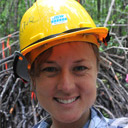
Prosper Sabongo, one of 25 Congolese PhD students in the forestry program at the University of Kisangani. Ollivier Girard/CIFOR
KISANGANI, Democratic Republic of Congo (14 November, 2012)_Deep in the Yoko Forest Reserve, across the Congo River from Kisangani in the Democratic Republic of Congo, Consolate Kaswera Kyamakya is checking her traps.
She’s been lucky – lying in the leaf litter is a stripy mouse-like creature known as an elephant shrew, prized by villagers in this area for food.
But Kaswera is no hunter. She’s a scientist, about to complete her PhD at the University of Kisangani.
“Elephant shrews, or Macroscelididae, are small mammals that are native to the DRC. They are consumed by the local population as bushmeat but until recently, we didn’t know anything about their diet, habitat, or density,” she says.
“As they are native species and are classified as vulnerable (by the IUCN red list of threatened species) we thought it was important to study and manage them correctly.”
The Yoko Forest Reserve protects 7000 hectares of Congo Basin rainforest from most human intervention, giving scientists from the university the chance to study relatively undisturbed populations of native species.
Kaswera’s research aims to discover more about threats to the two local species of elephant shrews, and the impact of human activities on their distribution, by comparing the populations of the animals inside the reserve with those outside.
“The number of farmers, hunters, and trappers is really on the rise. And as the big prey gets rarer, local people rely on small animals like this one for food,” she said.
“So our work has suggested that there is a need to raise the awareness of the local community about the pressure their activities place on the shrews.”
“If we do nothing about it, we risk the extinction of this population.”
New Generation
Kaswera is one of 25 Congolese PhD students enrolled in a special forestry research capacity-building program at the University of Kisangani.
Kisangani lies more than 1700 kilometres up the Congo River from Kinshasa. While the city was ravaged by war in the 1990s and early 2000s, a few scientists at the university continued to study the Congo Basin forests.
But the war took its toll. Training programs were disrupted, and by 2005, there were just a handful of Congolese forestry researchers left in the whole country.
The REFORCO (Congo Forestry Research) project, funded by the European Union and implemented by the Centre for International Forestry Research (CIFOR), along with several other partner institutions, aims to replenish the ranks and train a new generation of researchers like Kaswera.
“We have here in DRC the majority of Africa’s tropical forest so if we do not train the young people, who will manage these forests later?” says Professor Leopold Ndjele, the coordinator of the REFORCO program in Kisangani.
“That is one of the big successes of the program, to train the Congolese youth who will manage these forests,” he said.
It is not just PhD students who are supported: the project also funds the Masters of Forestry program. 35 students have already graduated, with 18 more currently in training.
“These youth will, after their training, work within the university, and succeed the current teachers. We are also training the future conservationists of nature, people who will help the population to fight against malnutrition, poverty and above all to achieve sustainable management of the forests,” Ndjele said.
Congo’s Patrimony
Prosper Sabongo is another PhD student in the program. He is analysing the composition of a particular type of forest ecosystem near Kisangani.
“This kind of forest is dominant in the Central Congo Basin so it is important to know about its dynamic.”
The huge trees in this forest store carbon, says Sabongo, which keeps it out of the atmosphere and slows global warming – meaning the Congo Basin is important not just for the DRC, but for everyone.
“We talk today about climate change. While the forest is intact, it can compensate for the harmful environmental effects that humans are producing.”
“Therefore we shall not forget or ignore this forest, given the current realities that humanity is experiencing.”
He also believes it’s important that Congolese people are involved in the preservation of their forests.
“The Congo Basin forest is a patrimony we have here in Congo, and as scientists, we have to know our immediate environment,” he said.
Role models
Consulate Kaswera has an additional motivation.
“There are only a few scientists at the University of Kisangani and in the DRC. And here at the university there are not even five women professors – the men are the majority. So I said to myself: ‘I have to try. I have to fight to get to this level’,” she said.
“If I am an example for the other young girls, for the other female students, this will be a good thing.”
“We have to have role models, we have to have leaders. If, despite all the difficulties, you manage to reach this stage it inspires others to be like you.”
For more stories from the Congo Basin, click here.
REFORCO (Appui à la Recherche Forestière au Congo) is funded by the European Union and implemented by CIFOR. The project is part of the CGIAR Research Program on Forests, Trees and Agroforestry.
We want you to share Forests News content, which is licensed under Creative Commons Attribution-NonCommercial-ShareAlike 4.0 International (CC BY-NC-SA 4.0). This means you are free to redistribute our material for non-commercial purposes. All we ask is that you give Forests News appropriate credit and link to the original Forests News content, indicate if changes were made, and distribute your contributions under the same Creative Commons license. You must notify Forests News if you repost, reprint or reuse our materials by contacting forestsnews@cifor-icraf.org.






















